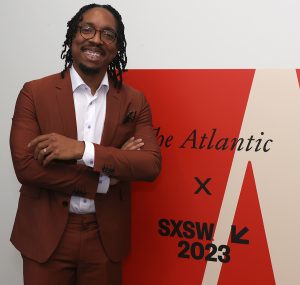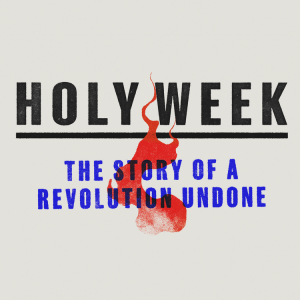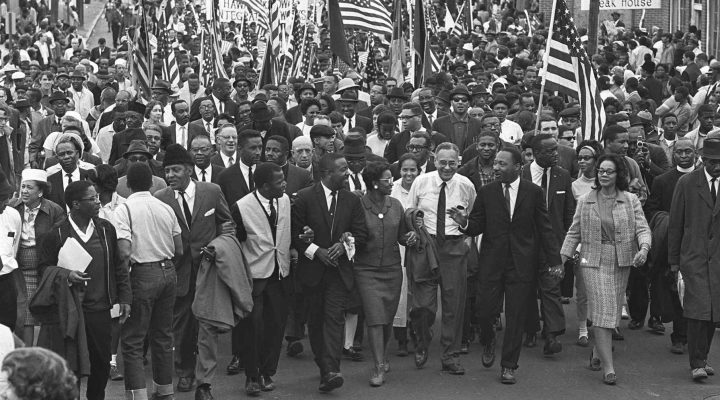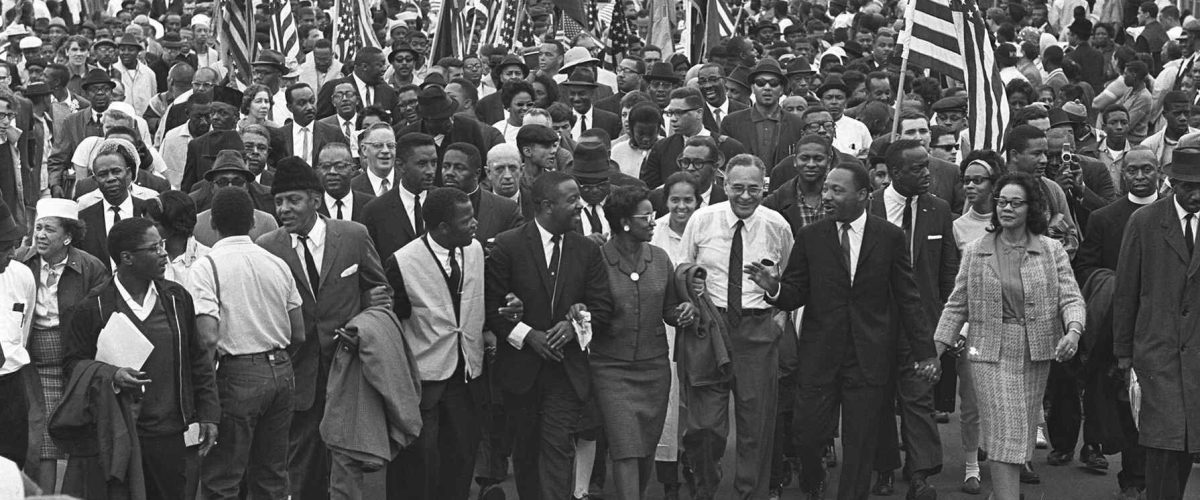Vann Newkirk II is senior editor of The Atlantic and one of our most thoughtful and talented writers on race, politics and culture. I first met him years ago when Baylor University sponsored an annual film program on race and film at Washington National Cathedral and Vann was part of a brilliant panel discussing Guess Who’s Coming to Dinner and Get Out.
Since then, we’ve participated in other programs together, and during the pandemic, he Zoomed into my classes to talk with my students about James Baldwin and the Baldwin documentary I Am Not Your Negro. Recently, The Atlantic launched Vann’s podcast “Holy Week,” which deals with the week after Martin Luther King Jr. was murdered, the political and cultural upheaval that resulted, and how the Civil Rights movement was sidelined and King converted into a departed martyr whose life and words can be commandeered by conservative politicians.

Vann R. Newkirk II attends “The Future of the Civil Rights Movement” during the 2023 SXSW Conference and Festivals at The LINE Austin on March 12, 2023, in Austin, Texas. (Photo by Travis P Ball/Getty Images for SXSW)
Vann spoke with me about “Holy Week” and his essential work exploring and explicating racism in America. I am grateful for him and for this conversation.
Greg Garrett: “Holy Week” is your second podcast for The Atlantic, following the acclaimed “Floodlines” which came out early in the pandemic. I think of you as one of our great writers on race, culture and politics, so I had to reframe my notions about your work to encompass an idea of you now as one of our great podcasters. How does the task of assembling a program like “Holy Week” differ from your work as a print journalist? How do you gather sound? Do you find it easier or harder to find your story in this medium?
Vann Newkirk II: Thank you so much for the kind words about my work. In all media, I still view myself as someone who is trying to learn and develop my craft so I can do justice to folks’ stories. Working on these podcasts is a different challenge than writing for print. For one, the information we convey is more emotional and contextual, and things like voice and scene setting matter more. As opposed to most written reporting, where most of my own voice exists to tell you what happened, in audio most of what I do as a narrator is tell you what you are hearing, which means being more descriptive and taking a less authoritative role. And what you’re hearing is usually a mix of things — interviews, sound design, archival tape — that is rich in a different way from what you’d read in print.
GG: Just as in “Floodlines,” you use human voices to help us enter into a significant historical event, and those voices serve as a kind of throughline for your listeners. In “Holy Week” I was strongly drawn to Vanessa Lawson, whose story about herself and her brother Vincent wrecked me. Who were the figures whose stories most compelled you? What was it like to be talking to these folks who had lived through such times?
VN: The stories I found the most compelling and the most explanatory of our interviews for “Holy Week” are the people you hear most from in the show. So there is Vanessa Lawson Dixon, who was a kid in D.C. when the riots started after the assassination of Martin Luther King Jr. We also spent a lot of time with John Burl Smith, a founding member of the Memphis Invaders, a Black Power group in Memphis that was one of the last to meet with King. Talking to them and to all our interviewees really helped highlight both how recent the uprisings in 1968 were, but also how much the world has changed since then. Above all, what struck me most was the fact that most of them were either teenagers or young adults in 1968. They were all trying to process a deeply traumatic time in a changing world in a fraught and delicate time in their lives. And I think the week made a mark on each of them.
“Today, as inspiring as his life and words remain, he’s safe, as John Burl Smith puts it, because he can’t do any more damage.”
GG: You edited an issue of The Atlantic on the 50th anniversary of Dr. King’s assassination a few years ago, so this subject matter is familiar territory for you. I think I’ve told you about my research in the LBJ Library uncovering the mass of 1968 telegrams, letters and telephone calls in which the president’s correspondents called Dr. King the most dangerous man in America. Today, as inspiring as his life and words remain, he’s safe, as John Burl Smith puts it, because he can’t do any more damage. What were your biggest revelations about how these seven days after Dr. King’s death helped turn him into a safe saint and derailed the movement? Can we reclaim that dangerously unselfish hero from 1968 and years of misreading?
 VN: Since our publication of the King issue in 2018, I’ve been interested in the public canonization of Martin Luther King Jr. and what his centrality to American identity means. The creation of a national hero in King was ostensibly a symbol of our overcoming the system he fought against and an embrace of his philosophy. But the reality wasn’t so triumphant. What I found while making “Holy Week” is that most Americans — most white Americans — did not agree with King when he died and were prone to view him as anti-American or a villain. So, embracing him when he died required an active erasure of the parts of him that were uncomfortable and challenging, and thus also minimizing the problem of white supremacy. I think the only way to reclaim the truth of King is to first tell the truth about what he was fighting — about where it came from, what it did and how it endures in American politics, economics and families.
VN: Since our publication of the King issue in 2018, I’ve been interested in the public canonization of Martin Luther King Jr. and what his centrality to American identity means. The creation of a national hero in King was ostensibly a symbol of our overcoming the system he fought against and an embrace of his philosophy. But the reality wasn’t so triumphant. What I found while making “Holy Week” is that most Americans — most white Americans — did not agree with King when he died and were prone to view him as anti-American or a villain. So, embracing him when he died required an active erasure of the parts of him that were uncomfortable and challenging, and thus also minimizing the problem of white supremacy. I think the only way to reclaim the truth of King is to first tell the truth about what he was fighting — about where it came from, what it did and how it endures in American politics, economics and families.
“Embracing him when he died required an active erasure of the parts of him that were uncomfortable and challenging.”
GG: I was struck over and over again in listening to “Holy Week” about the echoes of 1968 in our current politics and culture. Spiro Agnew could be a contender for the 2024 Republican nomination! Were these parallels something that initially drove you to do the project? Or did you realize many of these things during the process of putting the program together? What did you learn that we might be able to put to use in our present to build a more just nation?
VN: I’ve been interested in 1968 for a long time, partly because historians have pointed to it as an inflection point in history. So my interest predated any possible parallels between that history and the present. With that said, I think we’ve recently lived through some moments that might rightly be called inflection points themselves, especially in 2020. In particular, the legacy of white supremacy is particularly salient now, as is the same white backlash that King feared after the Civil Rights movement in the 1960s.
GG: The title of the program and the episode titles circle back to faith, hope and practice. You and I talk sometimes about faith in America, its good and bad manifestations. How was faith an organizing principle for this show? And if you’re willing to share, did you have any personal revelations as you were working on the podcast that might be of value to people of faith?
VN: It should surprise no one that “Holy Week” is a story about faith. Obviously, we are examining and dissecting the public religion that is sort of built around King and King’s own idea of redemptive suffering. But I was interested in more than that. I was interested in how King’s death tested or broke Black faith in America and how that broken covenant resulted in what were described as near-apocalyptic fires in Black communities. I’m interested in how individuals saw the hand of providence in their journeys through grief. Those journeys through grief were personally important to me, as someone who has wrestled with my own grief and tried to build a life around it. What I’ve found is that memory is how we cope with that grief, so it behooves me as a storyteller to take remembrance seriously.
Greg Garrett teaches creative writing, film, literature and theology classes at Baylor University. He is the author of two dozen books of fiction, nonfiction, memoir and translation, including the critically acclaimed novels Free Bird, Cycling, Shame and The Prodigal. His latest novel is Bastille Day. He is one of America’s leading voices on religion and culture. Two of his recent nonfiction books are In Conversation: Rowan Williams and Greg Garrett and A Long, Long Way: Hollywood’s Unfinished Journey from Racism to Reconciliation. He is a seminary-trained lay preacher in the Episcopal Church. He lives in Austin with his wife, Jeanie, and their two daughters.
Related articles:
Faith with a conscience: Martin Luther King as a model dissenter for Baptists, present and future | Analysis by Christian McIvor
Faith and civil rights went together for Martin Luther King | Opinion by Russell Waldrop
Remembering the real Martin Luther King: Forgive us, Lord | Opinion by J. Alfred Smith


